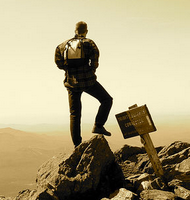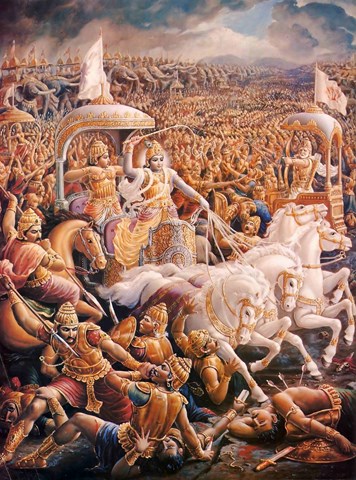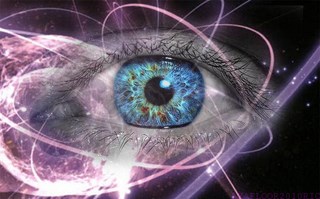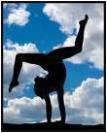 Have you ever watched a movie that at first you hated, only to find that later you really enjoyed it? For me, that movie was American Psycho. I could not resonate with it from the start as I was taking the story literally, and from that angle it seemed too silly for me to appreciate. I had to change my perspective from just over a quarter of the film and watch it from a totally different viewpoint. Once I did, I really loved the film. That experience opened my eyes to a universal truth: It is not what happens that matters as much as our perception of what happens.
Have you ever watched a movie that at first you hated, only to find that later you really enjoyed it? For me, that movie was American Psycho. I could not resonate with it from the start as I was taking the story literally, and from that angle it seemed too silly for me to appreciate. I had to change my perspective from just over a quarter of the film and watch it from a totally different viewpoint. Once I did, I really loved the film. That experience opened my eyes to a universal truth: It is not what happens that matters as much as our perception of what happens.
When speaking of material existence, our world arises from our human desires and fears. Think about this for a moment: All our inventions, conveniences, and civilizations have been borne from our desire to grow and automate – our desire to make things “better” or easier. We wanted better locomotion, and thus we tamed horses, built railroads, and mastered air flight. We wanted bigger civilization, so we expanded our towns into cities, built skyscrapers to the clouds, and sent our telecommunications into space. However, we have also created a world out of fears: the fear of others which has led to walls, wars, and mass surveillance on a scale beyond our wildest imaginations; and yet, most of us take in all this progress, a little bit for granted, but with wide-eyed astonishment.
Mentally, we spend our lives judging our experiences according to our likes and dislikes, which typically follow from our unique set of values. Those experiences which support our values by allowing us to fulfill them, of course, we call “good,” while those that challenge our values, by either denying us what we want or by threating them, we call “bad,” and avoid them like the plague. And we have a whole set of memories, both conscious and subconscious, which trigger our brain and hormonal system to respond automatically to our likes and dislikes symbolically represented in otherwise neutral experiences. In other words, we color our experiences with perceptions that stem from our value system.
 Spiritually speaking, if you feel comfortable calling it that, you have a purpose and mission underlying your existence. People who fail to recognize and tap into their purpose commonly feel “lost” and may seek out meaningful experiences through hedonism or altruism. Hedonism is the pursuit of self-indulgence, or immoderate pleasure seeking. Sex, drugs, food, music can all act as forms of sensory pleasures. Nothing wrong with any of them in moderation, but it is my observation that hedonistic people are some of the most unhappy and unfulfilled people in society. Altruism, on the other hand, is sacrificing the self to benefit others (some would say “help” others, but that is debatable). While altruism itself can lead to a feeling of purpose, left unbalanced it can also be unfulfilling and lead to conflict and burnout. But when people tap into their greater purpose, whether that be providing a product or service for the world or raising a beautiful family, they have a foundation by which to guide their actions, behaviors, decision, and perceptions.
Spiritually speaking, if you feel comfortable calling it that, you have a purpose and mission underlying your existence. People who fail to recognize and tap into their purpose commonly feel “lost” and may seek out meaningful experiences through hedonism or altruism. Hedonism is the pursuit of self-indulgence, or immoderate pleasure seeking. Sex, drugs, food, music can all act as forms of sensory pleasures. Nothing wrong with any of them in moderation, but it is my observation that hedonistic people are some of the most unhappy and unfulfilled people in society. Altruism, on the other hand, is sacrificing the self to benefit others (some would say “help” others, but that is debatable). While altruism itself can lead to a feeling of purpose, left unbalanced it can also be unfulfilling and lead to conflict and burnout. But when people tap into their greater purpose, whether that be providing a product or service for the world or raising a beautiful family, they have a foundation by which to guide their actions, behaviors, decision, and perceptions.
 Our lives are a composite of experiences (which are largely out of our immediate control but strongly influenced by our desires and fears), perceptions (colored by our likes and dislikes), and life’s purpose (realized through value fulfillment). Life’s purpose is immutable as it derives from the level of the higher mind. Our greater purpose, on the other hand, is universal, and it is simply to come to know the Self (yoking or yoga), and this is done primarily through acting within one’s life’s purpose (karma yoga). Because the world is composed of many souls, world events are aggregates of interacting actions, behaviors and decisions based on billions of likes and dislikes in varying combinations. These are complex and seemingly random, but there does exist a greater order in the totality of world events in the present time as well as in past and future events. But most important is how we see those experiences and what they mean to us in micro- and macrocosm of our lives. We call this perception.
Our lives are a composite of experiences (which are largely out of our immediate control but strongly influenced by our desires and fears), perceptions (colored by our likes and dislikes), and life’s purpose (realized through value fulfillment). Life’s purpose is immutable as it derives from the level of the higher mind. Our greater purpose, on the other hand, is universal, and it is simply to come to know the Self (yoking or yoga), and this is done primarily through acting within one’s life’s purpose (karma yoga). Because the world is composed of many souls, world events are aggregates of interacting actions, behaviors and decisions based on billions of likes and dislikes in varying combinations. These are complex and seemingly random, but there does exist a greater order in the totality of world events in the present time as well as in past and future events. But most important is how we see those experiences and what they mean to us in micro- and macrocosm of our lives. We call this perception.
 And this is what this piece is really about, how we see our lives. Not only does perception color the meaning we give to our lives, in both the microcosm of our daily events and the macrocosm of decades, quarter centuries, half centuries, and complete lifetimes, it is also the final determinant on our feelings of self-fulfillment. Now that might make some feel that they are either blessed with “good” perception, or what some call positive thinking, while others might feel they are cursed with “bad” perception, or negative thinking. And some of these people might beat themselves up for not having the correct perception and thus set out to change themselves. This, however, is a mistake. Perceptions can be changed but vacillating from one polar emotional view to another (the consequence of attempted self-change) is not the most empowering state one can achieve. Indeed, seeing both sides of an issue, simultaneously, is far more powerful and liberating than teetering. And more important is to see how every event in our lives – regardless of whether we initially perceive it as good or bad – is helping us along our path of purpose.
And this is what this piece is really about, how we see our lives. Not only does perception color the meaning we give to our lives, in both the microcosm of our daily events and the macrocosm of decades, quarter centuries, half centuries, and complete lifetimes, it is also the final determinant on our feelings of self-fulfillment. Now that might make some feel that they are either blessed with “good” perception, or what some call positive thinking, while others might feel they are cursed with “bad” perception, or negative thinking. And some of these people might beat themselves up for not having the correct perception and thus set out to change themselves. This, however, is a mistake. Perceptions can be changed but vacillating from one polar emotional view to another (the consequence of attempted self-change) is not the most empowering state one can achieve. Indeed, seeing both sides of an issue, simultaneously, is far more powerful and liberating than teetering. And more important is to see how every event in our lives – regardless of whether we initially perceive it as good or bad – is helping us along our path of purpose.
So what can you do to empower yourself in this area? First is to attune to your life’s purpose. You can do this by observing and recording your value system: how you spend your time, what you do without being told or without seeking outside motivation, what inspires you, and what you are driven to achieve. In other words, the things you value in life above all else. Pay attention and write them down – keep a journal. You will learn a lot about yourself by doing so. And you will find that your life’s purpose revolves around these things. This major uncovering will be invaluable in guiding your decision making and action.
 Next will be to train yourself to envision your conscious awareness as if you are witnessing a movie. Not simply the watching of a movie, however, but experiencing it in full Sensurround – that is, chock-full of sensory experiences from sight to sound to feel to taste and smell. It should not be too hard to imagine this perceptual viewpoint if you have ever played video games, experienced virtual reality, or been on the Disney California Adventure’s ride Soarin’ Over California. By experiencing consciousness from an objective standpoint, without getting attached to the outcome, you will come the closest to understanding what yogi’s describe as detachment. Think again about a movie. Do you really care about the outcome of the plot, to the degree that you lay awake at night, are unable to concentrate on your work, or cry uncontrollably at random times when thinking about it? Do you genuinely feel pain at the fate of any character in a film, no matter how tear-jerking the story? No, you watch, you experience emotion in the moment, and then you walk away, without attachment. Work hard to cultivate that same viewpoint in your own consciousness. I am not suggesting that this is an easy shift in perspective – very little is more challenging – but detachment leads to objectivity…which lessens emotionality…which increases appreciation, poise, and presence…and ultimately leads to gratitude. When you can say thank you for the world as it is, for all people exactly as they are, and for yourself and your beautifully unique, purposeful life, you vibrate at your highest frequency. We call this a state of unconditional love (“Thank you for all that is, as it is”).
Next will be to train yourself to envision your conscious awareness as if you are witnessing a movie. Not simply the watching of a movie, however, but experiencing it in full Sensurround – that is, chock-full of sensory experiences from sight to sound to feel to taste and smell. It should not be too hard to imagine this perceptual viewpoint if you have ever played video games, experienced virtual reality, or been on the Disney California Adventure’s ride Soarin’ Over California. By experiencing consciousness from an objective standpoint, without getting attached to the outcome, you will come the closest to understanding what yogi’s describe as detachment. Think again about a movie. Do you really care about the outcome of the plot, to the degree that you lay awake at night, are unable to concentrate on your work, or cry uncontrollably at random times when thinking about it? Do you genuinely feel pain at the fate of any character in a film, no matter how tear-jerking the story? No, you watch, you experience emotion in the moment, and then you walk away, without attachment. Work hard to cultivate that same viewpoint in your own consciousness. I am not suggesting that this is an easy shift in perspective – very little is more challenging – but detachment leads to objectivity…which lessens emotionality…which increases appreciation, poise, and presence…and ultimately leads to gratitude. When you can say thank you for the world as it is, for all people exactly as they are, and for yourself and your beautifully unique, purposeful life, you vibrate at your highest frequency. We call this a state of unconditional love (“Thank you for all that is, as it is”).
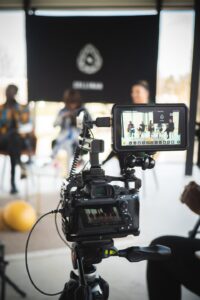 Just like watching a movie, we can change our perception of that which we become consciously aware of, and this, in turn, changes how we feel about the experience. Great sages have said that we suffer because we believe that what happens in any given moment, our present-time experience, is real. In other words, we believe in the reality of what we are consciously aware of, instead of viewing it as a sort of dream, or movie as I have proposed. Shifting the perspective from the self as an entity operating in an external world, and to whom things happen, to the objective witness in awe and appreciation of the magnificence of life and one’s purpose within it changes the experience, and thus the meaning (or mood) of the movie. Try out this perceptual alteration from time to time, or better yet commit to a regular practice; and enjoy the brief, yet profound, moments of a consciousness shift, which has the great potential to bring you into a vibration of unconditional love. Watching a movie in objective amazement is far different than attaching to the transient ups and downs of a film and suffering along with its characters and plot. Shift your perspective, watch your gratitude soar, and bask in the illumination of unconditional love.
Just like watching a movie, we can change our perception of that which we become consciously aware of, and this, in turn, changes how we feel about the experience. Great sages have said that we suffer because we believe that what happens in any given moment, our present-time experience, is real. In other words, we believe in the reality of what we are consciously aware of, instead of viewing it as a sort of dream, or movie as I have proposed. Shifting the perspective from the self as an entity operating in an external world, and to whom things happen, to the objective witness in awe and appreciation of the magnificence of life and one’s purpose within it changes the experience, and thus the meaning (or mood) of the movie. Try out this perceptual alteration from time to time, or better yet commit to a regular practice; and enjoy the brief, yet profound, moments of a consciousness shift, which has the great potential to bring you into a vibration of unconditional love. Watching a movie in objective amazement is far different than attaching to the transient ups and downs of a film and suffering along with its characters and plot. Shift your perspective, watch your gratitude soar, and bask in the illumination of unconditional love.








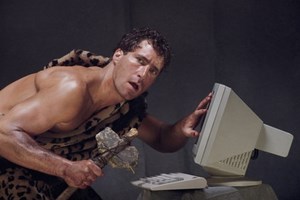
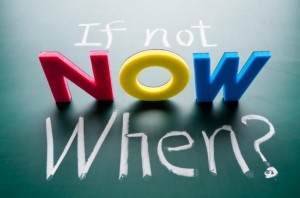

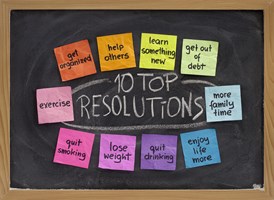
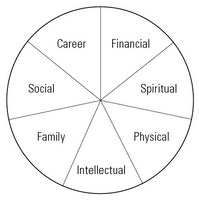 Next I focus on every aspect of life, and categorize my intentions as such. The seven aspects of life are physical, mental, spiritual, social, financial, professional and familial. I write down exactly what I would love in each one of these areas. I then write down everything I would love to accomplish in each life category. For example, every year I read or take courses that equal up to thirty books. I have an idea of what I would love to learn through the knowledge of my dharma, and so when focusing on that, it guides me to the books and courses which I will tackle in any given year. It would be highly unrealistic of me to set an intention of reading forty books in a year. It might be possible…just rather unlikely, so I don’t set my sights that high. I think setting the intention of twelve to twenty books to read is doable. But I don’t just say, “I will read 12-20 books this year.” I actually write down the titles of the books I know I will wish to tackle. Sometimes I don’t read every single book on my list, but I can tell you that I mostly do.
Next I focus on every aspect of life, and categorize my intentions as such. The seven aspects of life are physical, mental, spiritual, social, financial, professional and familial. I write down exactly what I would love in each one of these areas. I then write down everything I would love to accomplish in each life category. For example, every year I read or take courses that equal up to thirty books. I have an idea of what I would love to learn through the knowledge of my dharma, and so when focusing on that, it guides me to the books and courses which I will tackle in any given year. It would be highly unrealistic of me to set an intention of reading forty books in a year. It might be possible…just rather unlikely, so I don’t set my sights that high. I think setting the intention of twelve to twenty books to read is doable. But I don’t just say, “I will read 12-20 books this year.” I actually write down the titles of the books I know I will wish to tackle. Sometimes I don’t read every single book on my list, but I can tell you that I mostly do. In the family section, I may want to teach one of my children how to swim—and on to the list it goes. I may wish to focus on saving a certain percentage of my income—and on to the financial list it goes. I may want to dedicate a certain amount of time to social media—I don’t leave this to chance or
In the family section, I may want to teach one of my children how to swim—and on to the list it goes. I may wish to focus on saving a certain percentage of my income—and on to the financial list it goes. I may want to dedicate a certain amount of time to social media—I don’t leave this to chance or 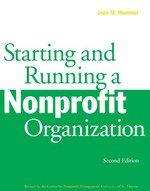 So you may have a dream of running a
So you may have a dream of running a 